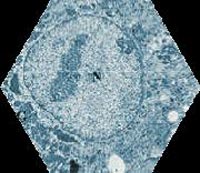Preclinical costs reduced by new human cell culture system from Northern Germany

Mikroskopische Aufnahme einer humanen Leberzelle, Primacyt GmbH
The PRIMACYT Cell Culture Technology GmbH has developed serum-free long-term culture techniques for hepatocytes. These technologies allow utilization of human and other mammalian hepatocytes as biosensors for screening purposes, while the hepatocyte specific functions remain intact. On this basis, new innovative products and services will be created to provide pharmaceutical and biotech companies as well as public research institutions with state of the art solutions for their specific demands.
The major advantages of this hepatocyte culture system are its robustness and the fact that the hepatocytes remain differentiated and functional for several weeks. Preliminary studies have revealed that repetitive cycles of drug administrations can be applied to the cells. In other words, the hepatocytes may not only be used for one experiment, but instead can be “recycled” and may be used for a second, a third or even a fourth round of experiments. Thereby, the system is designed to reduce the number of animal experiments and to reduce the costs of preclinical studies.
The company is presenting its human hepatocyte culture system HEPAC2 at the annual Experimental Biology meeting in San Francisco, April 1-5, and at the 13th Conference on Alternatives to Animal Testing in Linz, Austria, on June 2-4. “These are a great opportunities for our company to demonstrate the advantages of our culture system to a broad audience” said Dr. Dieter Runge, co-founder and CEO of this young biotech company.
PRIMACYT Cell Culture Technology GmbH has its roots in HeparCell GmbH, originally founded by 4 private individuals in June 2004. In December 2004 HeparCell completed a private financing round led by Genius Venture Capital GmbH. In January 2005 HeparCell started its business at the Technologie- und Gewerbezentrum Schwerin. In October 2005 HeparCell GmbH changed its corporate name to PRIMACYT Cell Culture Technology. PRIMACYT is member of BioCon Valley.
BioCon Valley is the initiative for Life Science and health economy of Mecklenburg-Vorpommern, Germany. As one of the German BioRegions BioCon Valley supports the commercial use of modern life sciences and bio- and medical technologies in the region. BioCon Valley s tasks are networking, managing life science centers (bioincubators), project management and coordination, and life science specific public relation. BioCon Valley collaborates in strategic partnership to the life science initiatives at the Baltic Sea (www.scanbalt.org).
Contact:
PRIMACYT Cell Culture Technology GmbH
Dr. Dieter Runge
Hagenower Straße 73
19061 Schwerin
Germany
Telefon: +49 (0)385 – 3993 600
Telefax: +49 (0)385 – 3993 602
E-mail: info@primacyt.de
Media Contact
All latest news from the category: Life Sciences and Chemistry
Articles and reports from the Life Sciences and chemistry area deal with applied and basic research into modern biology, chemistry and human medicine.
Valuable information can be found on a range of life sciences fields including bacteriology, biochemistry, bionics, bioinformatics, biophysics, biotechnology, genetics, geobotany, human biology, marine biology, microbiology, molecular biology, cellular biology, zoology, bioinorganic chemistry, microchemistry and environmental chemistry.
Newest articles

A universal framework for spatial biology
SpatialData is a freely accessible tool to unify and integrate data from different omics technologies accounting for spatial information, which can provide holistic insights into health and disease. Biological processes…

How complex biological processes arise
A $20 million grant from the U.S. National Science Foundation (NSF) will support the establishment and operation of the National Synthesis Center for Emergence in the Molecular and Cellular Sciences (NCEMS) at…

Airborne single-photon lidar system achieves high-resolution 3D imaging
Compact, low-power system opens doors for photon-efficient drone and satellite-based environmental monitoring and mapping. Researchers have developed a compact and lightweight single-photon airborne lidar system that can acquire high-resolution 3D…





















